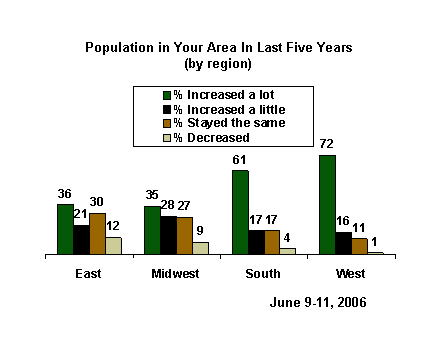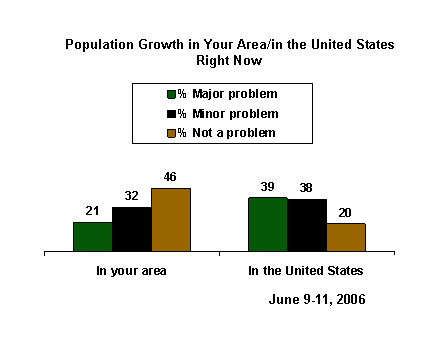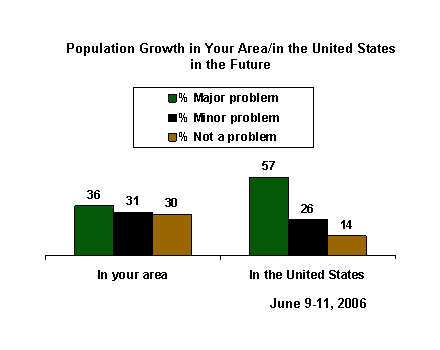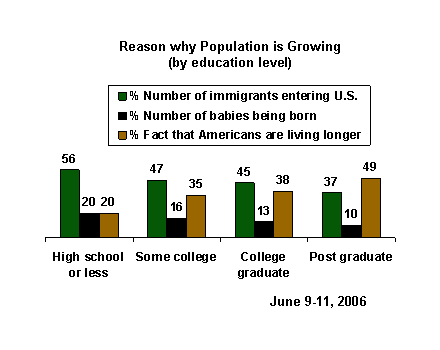Results 1 to 1 of 1
Thread Information
Users Browsing this Thread
There are currently 1 users browsing this thread. (0 members and 1 guests)
-
07-14-2006, 01:27 PM #1
Majority Says Population Growth is Major Problem for U.S. Fu
To see some of the charts please click the link.
http://poll.gallup.com/content/?ci=23770
July 14, 2006
Majority Says Population Growth is Major Problem for U.S. Future
A majority says population has increased a lot in their local area in last five years
by Jeffrey M. Jones
GALLUP NEWS SERVICE
PRINCETON, NJ -- With the U.S. population on pace to reach 300 million this year, a recent USA Today/Gallup poll assessed Americans' views on population growth in the country and in their local areas. Most view population growth as a bigger problem for the United States than for their local areas, but expect it to become an issue of increasing concern in the years ahead. The public is evenly divided as to whether population growth will make the United States more competitive or less competitive economically in the future. Americans are most likely to attribute the growth in population to increased immigration, but a substantial proportion believes it is mainly due to people living longer. Americans' estimates of the actual U.S. population vary widely.
Population Growth
The June 9-11 poll finds a majority of Americans, 51%, saying that population in the area where they live has "increased a lot in the past five years." Another 20% say it has increased a little, while 27% say it has either stayed the same (21%) or decreased (6%).
Perceived changes in local population vary dramatically by region. Residents of the west and south are most likely to say population has increased in their local areas -- 71% of westerners and 62% of southerners report a big increase in local population, compared with just 36% of easterners and 35% of Midwesterners.

A majority of urban (53%) and suburban (58%) residents also say population has increased a lot in their area, while only 36% of rural residents say the same.
The Problem of Population Growth
Americans are more likely to see population growth as a challenge for the country than for their local area. Fifty-three percent say it is a problem in their local area, including 21% who describe it as a "major problem," whereas 77% see it as a problem for the United States, with 39% viewing it as a major problem.

Looking to the future, Americans believe population will increasingly become an issue both in their local areas and in the country more generally. In fact, a majority predict it will be a major problem for the United States in the future.

There are regional differences in the perceived problems of population growth, with Midwestern residents more sanguine about the problem and western residents showing greater concern. Western residents are most likely to describe local population growth as a problem with 36% describing it as a major problem. At the other extreme, 60% of Midwesterners say it is not a problem in their local area.
Residents in all regions expect population growth to become an increasing challenge in the future. Southern residents are twice as likely to believe population growth will be a major problem in their local area in the future as say that about the current situation. Eastern residents show a similar expectation.
Apart from Midwestern residents, Americans in the other regions of the country view the problem of population growth in the United States similarly. Americans in all parts of the country expect it to be an increasing problem in the future, with westerners slightly most likely to view it as a major problem down the road.
Perceived Problem of Population Growth in United States
The poll informed respondents that population is expected to grow by another 120 million in the United States over the next 50 years, and asked them what effect they think this will have on the United States' ability to compete economically with other countries. Americans divide evenly in their responses –33% think it will make the United States more competitive, 29% think it will make it less so, and 34% do not think it will make much difference.
Opinions on this topic vary little by subgroup, although non-whites (47%) are significantly more likely than whites (28%) to say that the increased population will enhance the United States' ability to compete.
Americans Knowledge of the U.S. Population
In addition to assessing their attitudes about the U.S. population, the poll also asked Americans for their best guess of the U.S. population. The results are as follows:
What is your best guess as to the current population of the United States? [OPEN-ENDED]
Overall, the public's estimates vary widely. Only 2% correctly place the current population in the range of 280-299 million, but about as many offer a lower estimate (36%) as a higher estimate (35%). As a result, the median estimate – which represents the middle value of all guesses – is fairly accurate at 280 million. Because many respondents offered very high estimates of 1 billion and well beyond, the mean estimate is heavily skewed at slightly over 1 billion people.
Nearly half of Americans correctly attribute immigration as the main reason for the United States' increased population. Thirty-one percent believe the main reason is that people are living longer, and 16% think it is because of a greater number of babies being born in the United States.
In an interesting twist, Americans with less formal education are the most likely to correctly attribute population growth to immigration, while Americans with post-graduate education are least likely to do so. Highly educated Americans are most likely to believe population growth is primarily due to longer life spans.

Survey Methods
These results are based on telephone interviews with a randomly selected national sample of 1,002 adults, aged 18 and older, conducted June 9-11. For results based on this sample, one can say with 95% confidence that the maximum error attributable to sampling and other random effects is ±3 percentage points. In addition to sampling error, question wording and practical difficulties in conducting surveys can introduce error or bias into the findings of public opinion polls.
11. In the past five years, has the population in the area where you live increased, stayed about the same, or decreased? [Has it increased a lot, or only a little?]
16. What is your best guess as to the current population of the United States? [OPEN-ENDED]
17. As you may know, the U.S. population is expected to grow by about 120 million over the next 50 years. How do you think this will affect the ability of the United States to compete economically with other countries? Do you think it would make the U.S. -- [ROTATED: more competitive, would it not make much difference, or would it make the U.S. less competitive]?
18. If you had to choose, what do you think is the main reason why the U.S. population is growing? Do you think it is mostly due to -- [ROTATED: the number of immigrants entering the country, the number of babies being born in the U.S., (or mostly due to) the fact that Americans are living longer]?Support our FIGHT AGAINST illegal immigration & Amnesty by joining our E-mail Alerts at http://eepurl.com/cktGTn


 LinkBack URL
LinkBack URL About LinkBacks
About LinkBacks




 Reply With Quote
Reply With Quote

Durbin pushes voting rights for illegal aliens without public...
04-25-2024, 09:10 PM in Non-Citizen & illegal migrant voters